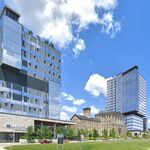Beyond WTC
Outside of Lower Manhattan, the Port Authority has a vast portfolio of real estate assets. They include a 50-acre mixed-use site on the Hoboken waterfront with a pair of office buildings, 526 residential units and a 265-key hotel and a waste-to-energy plant in Essex County. It also owns portions of a 12-acre industrial park in Elizabeth, N.J. as well as a legal-and-communications center in Newark that’s controlled by a private operator under a 50-year lease.
The agency controls the
80-acre Teleport industrial complex on Staten Island through a ground lease that expires in 2024. Earlier this year the authority’s board voted to carve 9 acres off from the lease and sell them to a private developer for $3.6 million, splitting the revenues from the sale with the New York City Economic Development Agency. In the Bronx, the agency’s board voted last month to sell its leasehold interest on the 454,000 square foot Bathgate Industrial Park for $16.5 million.
On the northwestern tip of Staten Island, the agency operates the 311-acre Howland Hook Marine Terminal and under a long-term lease with the city expiring in 2058, but a sale is unlikely given that the 2014 special report identified it as important to the Port Authority’s core mission, even if it does operate at a loss of $30 million.
Red Hook Terminal in Brooklyn
In Brooklyn, the agency owns a pair of properties that not only lose money each year, but are all but obsolete to the Port Authority’s mission.
In 1956, the agency began acquiring land that grew to what is now 110 acres spread across the
Red Hook Container Terminal and the Brooklyn-Port Authority Marine Terminal. The latter property sits at the southern edge of Brooklyn Bridge Park where a joint venture led by Robert Levine’s RAL Development Services plans to
build a pair of residential buildings with 192 condos, 30 market-rate rentals and 117 affordable rental units.






